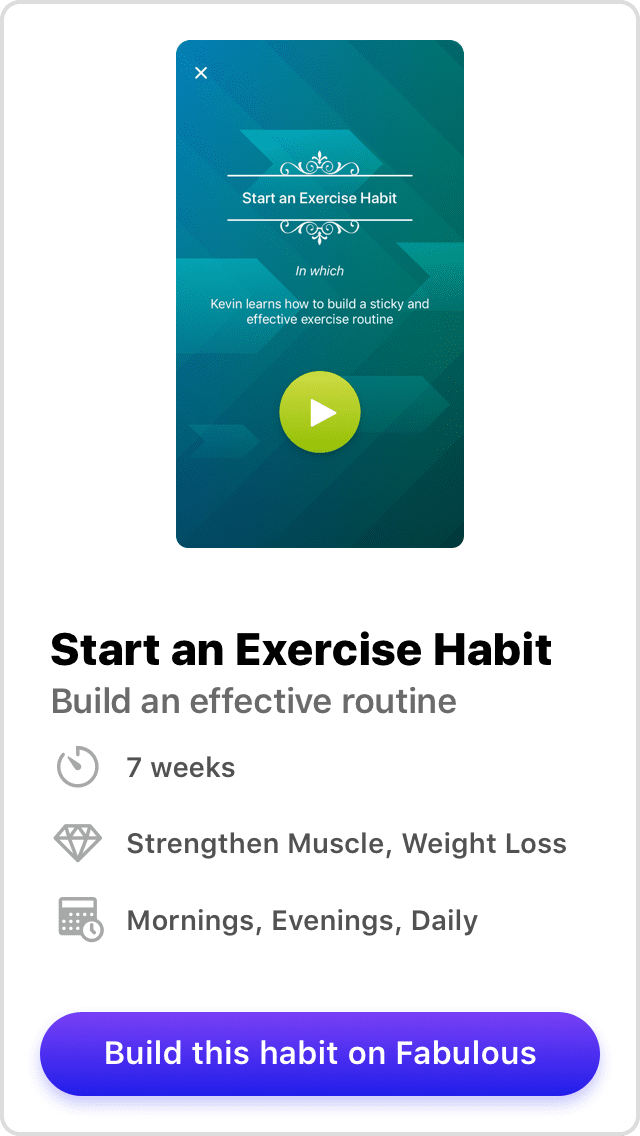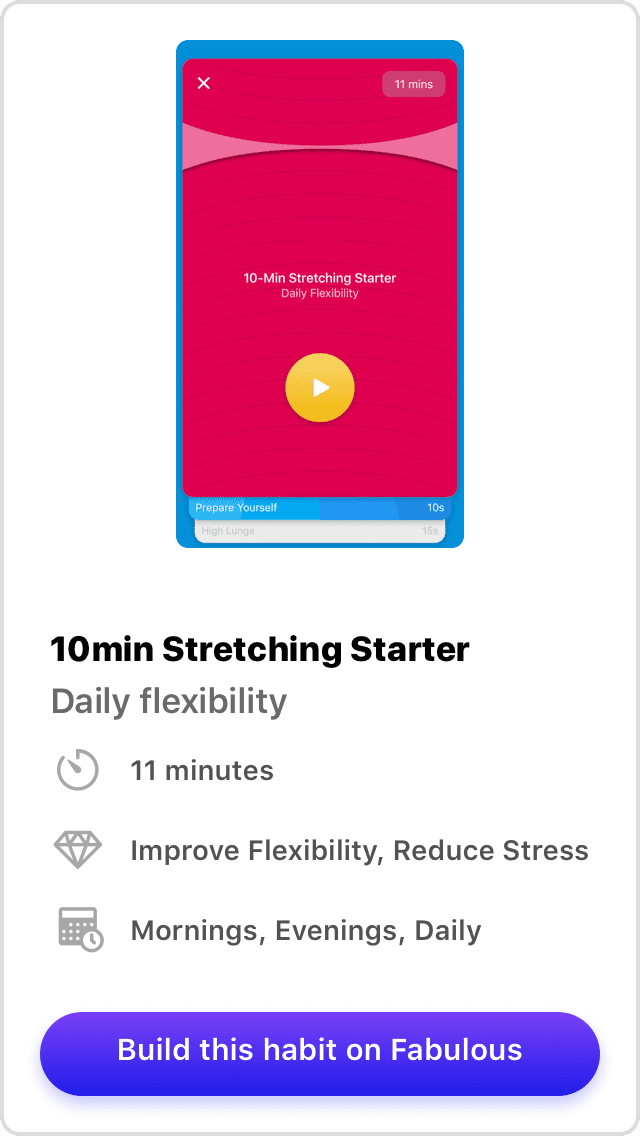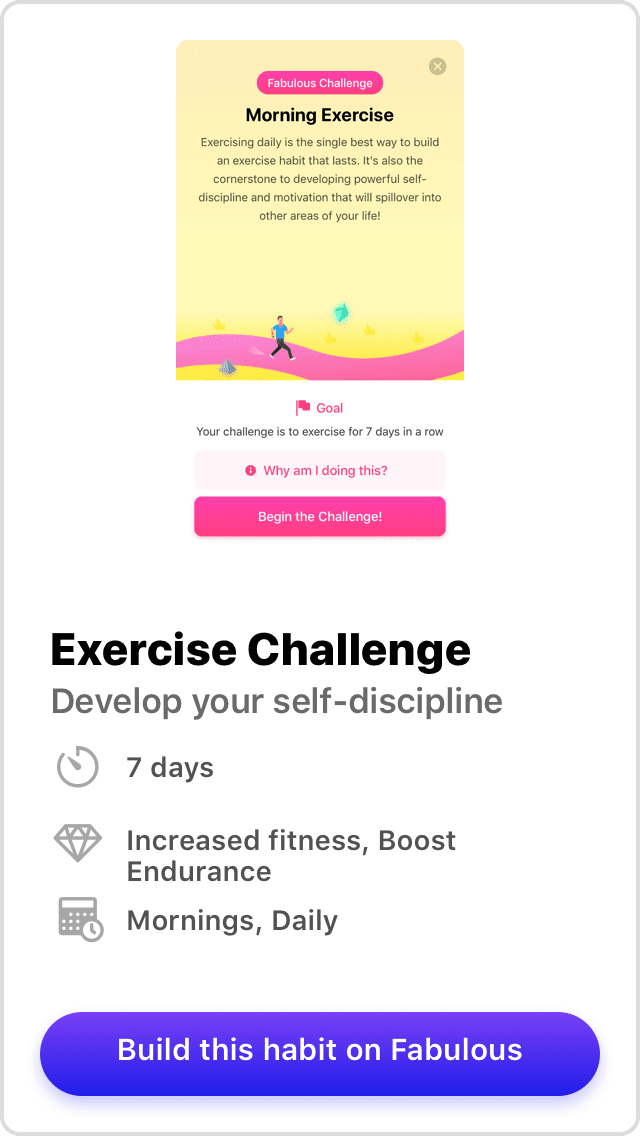By now it’s been well-established that running is an extremely beneficial exercise. We all associate fitness with the image of a fitness guru on their morning run or smiling after completing a marathon. So, you’d definitely be moving in the right direction if you decided to tie your shoes and step out for a run.
But here’s a question that stumps many beginners, and even threatens to derail the whole endeavor before their feet even hit the ground: When should I run? First thing in the morning? Or before I get ready for bed?
Like many things in life, there’s no simple, definitive answer to this question. When you should run depends on several factors, such as what you want to achieve, your physical and mental condition, and your environment. Today, we’ll look at the perks and drawbacks of both a morning run and a night run.
Want to improve your fitness levels? The “Start an Exercise Habit” Sphere Journey in the Fabulous app will teach you how to build an effective workout routine!
Starting the Day With A Morning Run
Advantages
Increases Energy
It’s common to see coffee shops teeming with joggers in the morning, waiting for their caffeine fix. Interestingly enough, most of them already seem refreshed! There’s a simple scientific reason for that. Running in the morning boosts the supply of oxygen and flow of blood within the body, providing you with the energy to kickstart the day.
Revs Up Metabolism
One of the best ways to burn fat is by going for a morning run. Since your last meal was likely more than 7 hours ago, your body will rely on stored fat for energy. Just make sure not to undo your efforts by scarfing down pancakes or muffins for breakfast!
Improves Mood
Most people are at their grumpiest just after waking up. There’s a reason why mugs printed with the words “Don’t Talk To Me Till I’ve Had My Coffee” are so popular! But what we simply refer to as “grumpiness” or “crankiness” is actually caused by high levels of cortisol, a.k.a “the stress hormone.” A morning run helps to lower cortisol levels, as well as stimulate the production of endorphins, which are natural mood elevators.
Builds Muscle
Here’s another hormone to consider when choosing a morning run: testosterone. It’s crucial for muscle growth, and production is at its highest between 5 and 8 A.M. If you pair your run with a protein-rich breakfast, your body will respond by repairing and building muscle.
Disadvantages
Higher Chance of Injury
Early in the morning, your body temperature is comparatively low. This means your muscles are not as supple and warmed up as they should be. This is why some morning runners end up injuring themselves. Remember to always warm up properly before dashing off.
Never underestimate the importance of stretching! Do the “10-Min Stretching Starter” session from the app’s Make Me Fabulous section to warm up for your run!
Waking Up Early Is Hard
It doesn’t matter how beneficial a morning run is if you aren’t able to wake up for it! Sure, sometimes hitting the snooze button is a sign of straightforward laziness. However, in some cases, your body and mind might not be comfortable with an early morning run. It might be due to the cold weather outside, the quality of your sleep, or just the way your internal body clock functions. The point is not to force yourself to run in the morning if it doesn’t feel like a natural fit. After all, there are plenty of night runners out there!
Ending the Day With A Night Run
Advantages
Increased Endurance Levels
If you are running longer distances, it’s perhaps best to train at night. Your body will be warmed up by then, meaning the chances of injury are greatly reduced. The calories consumed throughout the day will provide the fuel that will allow you to run more and thereby build stamina.
Relieves Stress
A lot of people love to run in the evening because it helps them to relax. Studies have shown that running is a great way to decompress after a long day at work. It also helps in lowering blood pressure and boosting endorphin production.
Disadvantages
Disturbed Sleep
While running can help you blow off steam after a tough day, it can also energize you too much. The increase in heart rate can make it difficult for you to sleep after a run. Some people end up lying in bed, wide awake, as though they just had a cup of coffee. If this happens to you, try to run earlier in the evening so that your body has enough time to cool down.
Morning Run or Night Run?
Now that you are aware of the relative merits of morning and night runs, it’s time to make a personal choice. Remember, the goal is to choose what is best for you, not what is ideal. If you’ve decided to opt for running as your exercise of choice, the next step is to experiment and then decide which time of the day works. You might not feel completely enthusiastic or comfortable with either option, which is fine. Comfort and enthusiasm will come later, once you’ve made a habit of running regularly.
But don’t spend too much time exploring all the benefits and drawbacks of a morning or evening run. After all, there’s a fine line between preparation and procrastination!
Ready to commit to regular exercise? Take up the “Morning Exercise” challenge and complete 7 days of working out in a row!






